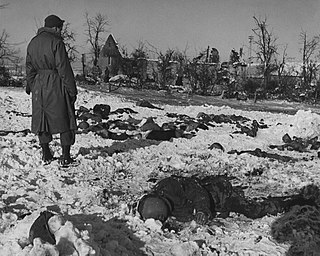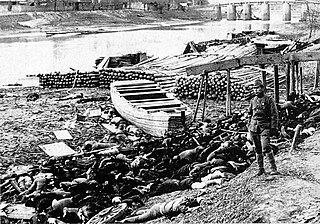International law
Although the 1929 Geneva Convention on Prisoners of War provided the regulations how prisoners of war should be treated, the Empire of Japan never signed the agreement (except the 1929 Geneva Convention on the Sick and Wounded). [2] However, many of the alleged crimes committed by imperial personnel were also violations of the Japanese code of military law, which Japanese authorities either ignored or failed to enforce. The empire also violated provisions of the Treaty of Versailles, such as article 171, which outlawed the use of poison gas (chemical weapons), and other international agreements signed by Japan, such as the Hague Conventions of 1899 and 1907, which protect prisoners of war (POWs). According to historian Akira Fujiwara, Hirohito personally ratified on 5 August 1937 a proposition by his Army chief of staff, Prince Kan'in Kotohito, to remove the constraint of those conventions on the treatment of Chinese prisoners. [3]
Japan and international treaties
In Japan, the term "Japanese war crimes" generally refers to cases tried by the International Military Tribunal for the Far East, also known as the Tokyo Trials, following the end of the Pacific War. The tribunal did not prosecute war crimes allegations involving mid-ranking officers or more junior personnel. Those were dealt with separately in other cities throughout the Asia-Pacific region.
The Japanese government said that Japan was not a signatory to the 1929 Geneva Convention on Prisoners of War, although it was the signatory of the 1907 Hague Convention, which provided humane treatment of prisoners of war (POWs), and the 1929 Geneva Convention on the Sick and Wounded Armed Forces in the Field, which provided humane treatment for enemy combatants who were injured, sick, or any other causes in the battlefield. It also signed the Kellogg-Briand Pact in 1929, thereby rendering its actions in 1937–45 liable to charges of crimes against peace, a charge which was introduced at the Tokyo Trials to prosecute Class-A War Criminals. (Class-B War Criminals are those found guilty of war crimes per se, and Class-C War Criminals are those guilty of crimes against humanity.) However, any convictions for such crimes are not required to be recognized by the Japanese government, as the Kellogg-Briand Pact did not have an enforcement clause stipulating penalties in the event of violation.
The Japanese government accepted the terms set by the Potsdam Declaration (1945) after the end of the war. The declaration alluded, in Article 10, to two kinds of war crime: one was the violation of international laws, such as the abuse of prisoners of war (POWs); the other was obstructing "democratic tendencies among the Japanese people" and civil liberties within Japan.
Japanese law
Japanese law does not recognize those convicted in the Tokyo Trials and other trials as criminals, despite the fact that Japan's governments have accepted the judgments made in the trials and in the Treaty of San Francisco (1952). This is because the treaty does not mention the legal validity of the tribunal. In the Japanese text, the word used for "accept" is judaku, as opposed to the stronger shounin ("to approve"). Those convicted have had no ability, under Japanese law, to appeal, as the Tokyo Tribunal and other war crimes courts have no standing in Japanese law. Under normal circumstances, it violates a number of fundamental principles of modern legal procedure to punish someone whose crime and penalty were defined only after the fact. Had Japan certified the legal validity of the war crimes tribunals in the San Francisco Treaty, this might have resulted in Japanese courts reversing such verdicts. Any such outcomes would have created domestic political crises and would have been unacceptable in international diplomatic circles.
The current Japanese jurists' consensus[ who? ] regarding the legal standing of the Tokyo tribunal is that, as a condition of ending the war, the Allies demanded a number of conditions including the execution and/or incarceration of those whom they deemed to be responsible for the war. These people were defined as guilty by a tribunal organized by the Allies. The Japanese government accepted these demands in the Potsdam Declaration and then accepted the actual sentencing in the San Francisco Treaty, which officially ended the state of war between Japan and the Allies. Although the penalties for the convicted, including execution, can be regarded as a violation of their technical legal rights, the constitution allowed such violations if proper legal procedure was followed, in the general public interest. Therefore, any such execution and/or incarceration is constitutionally valid, but has no relationship to Japanese criminal law. Hence those convicted as war criminals are not defined as criminals in Japan, although their execution and incarceration is regarded as legally valid.













